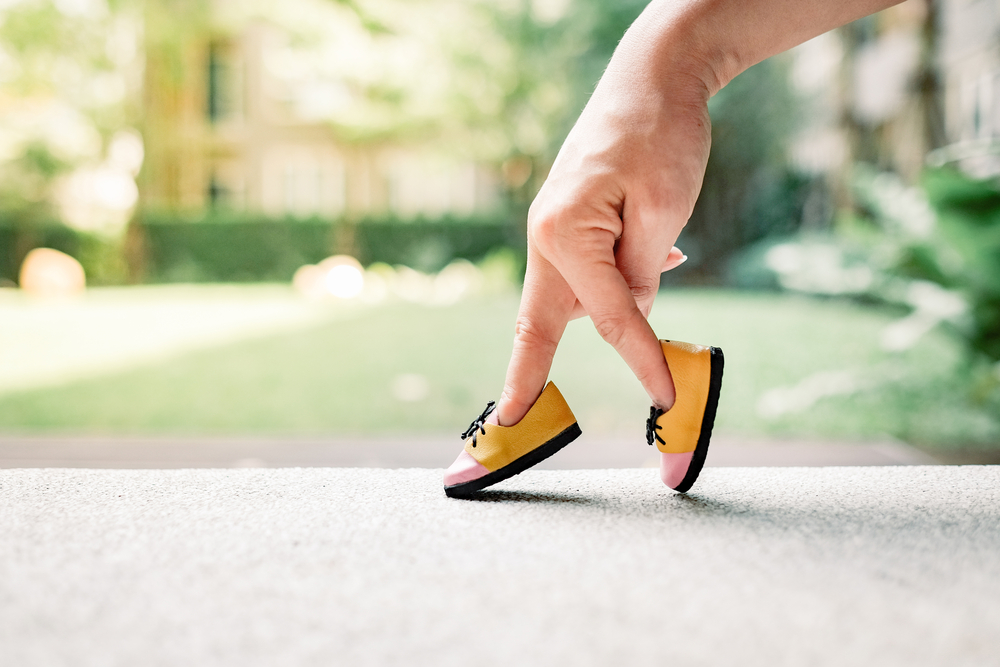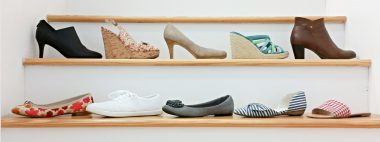Caregiving and Convenience: If the Shoe Fits
Written by |

One of the first casualties of taking on the role as my husband’s caregiver was high heels. That’s ironic, since he is the one who convinced me to wear them.
From flats to heels
Before we met, I always wore flats. It was sneakers and loafers on my own time, ballet flats and mules in the office. I had one pair of kitten heels reserved for important meetings.
“You have good legs. You should wear high heels,” my husband, Ronald, said more than once while we were dating. I was hesitant, unsure of balancing on them by myself.
“Don’t wear them by yourself,” he said. “Wear them when we go out. You can hold on to my arm.” So, for his birthday, I bought myself a pair of two-inch high black pumps and out we went, with me showing off my legs and him showing me off.
From then on, I wore heels or platforms whenever we went out. We got married and went into business together, and I wore them at home and in the studio, too.
I kept a few pairs of sneakers and work boots around for backup when cleaning, gardening, or climbing ladders. Otherwise, whether we were heading for the aisles of the local grocery store or the grandest staircase in the state, I always opted for adding three or four inches to my stature.
And back again
When I realized I had to get my husband to the emergency room at the onset of his atypical hemolytic uremic syndrome (aHUS), I grabbed the backup flats. I slipped into a ratty old pair of maypops without bothering to untie them, crushing the back canvas down to the sole with my heel and hitting the gas.
We spent the next three weeks in the hospital’s critical care unit, with me clad in my old cheap sneakers alongside my bedridden and barefoot beloved. I never missed my usual shoes because they would not have been the least bit useful.
The hospital corridors were long, and I walked them briskly by myself. I sprinted up and down the escalator to get back to his room with my lunch before his meal arrived. In the middle of the night, I tiptoed past open doors of sleeping patients to forage snacks from the self-serve kitchen or snag a change of sheets from the laundry closet. High heels are not practical for hospital reconnaissance.

“Walk This Way”: The author’s fashion sense was replaced by common sense. (Photo by Annie Dixon)
Then home again
Returning home, I had no use for my former fashion statements, either. I was up and down our staircase all day and many nights. Each trip, I was carrying food, drink, pills, medical supplies, laundry, books, and whatever else he needed or I forgot.
Not only did I not have my husband’s arm to hang on to, he was now hanging on to mine just to get from the bed to the chair or the shower. He was weak and unsteady and leaned on me for support, which would be hard to provide atop my favorite narrow spikes.
Some days, we ventured downstairs to the living room or the porch together. This required me to descend a step in front and ascend a step behind, convincing us both I could catch him if he began to fall. High heels would have destroyed the illusion; this was a job for sensible nonslip treads.
I never imagined I would become a caregiver to a rare disease patient. When asked about my unexpected role, I find it difficult to explain to women who have not walked a mile in my shoes. So, if they want to understand, I suggest they start by wearing flats.
***
Note: aHUS News is strictly a news and information website about the disease. It does not provide medical advice, diagnosis, or treatment. This content is not intended to be a substitute for professional medical advice, diagnosis, or treatment. Always seek the advice of your physician or other qualified health provider with any questions you may have regarding a medical condition. Never disregard professional medical advice or delay in seeking it because of something you have read on this website. The opinions expressed in this column are not those of aHUS News or its parent company, Bionews, and are intended to spark discussion about issues pertaining to neuromyelitis optica spectrum disorder.






Leave a comment
Fill in the required fields to post. Your email address will not be published.